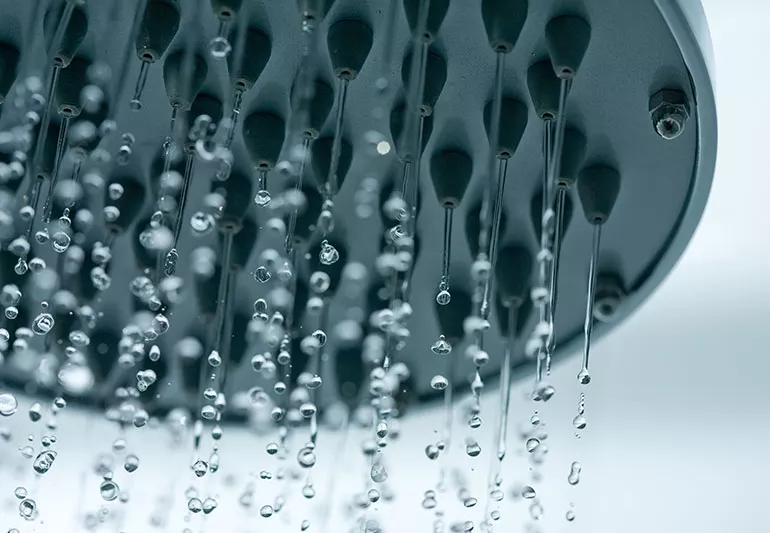The potential benefits to your circulation and metabolism may not be worth the discomfort

Image content: This image is available to view online.
View image online (https://assets.clevelandclinic.org/transform/47b52701-2401-4150-97fb-af15ec5e4991/ColdShower-173010583-770x533-1_jpg)
A close-up of streams of water pouring out of a shower head
Do cold showers offer health benefits that last longer than your goosebumps? It’s an idea with definite shock value, but be cautious before jumping in, says exercise physiologist Zach Carter, CSCS.
Advertisement
Cleveland Clinic is a non-profit academic medical center. Advertising on our site helps support our mission. We do not endorse non-Cleveland Clinic products or services. Policy
Numerous internet headlines tout the advantages of chilling in the shower. Potential benefits include everything from improving your circulation to weight loss to ramping up your immune system. But while there is science and research behind the claims, taking a cold shower should not be viewed as a cure-all or replacement for more traditional (and warmer) wellness therapies, explains Carter.
“There is a potential upside,” explains Carter. “The question is whether it’s worth the stress you put your body through in the process.”
There’s a reason your first reaction to a polar blast of H2O is to move away from it: Cold water strains your body. The natural response to icy water hitting your skin is your system flipping the switch to survival mode.
The shock brought by cold water puts your circulatory system into overdrive. Your body increases blood flow to warm your core and protect vital organs. At the same time, it constricts circulation near your skin.
This process stimulates blood flow, which – on the whole – is a good thing for your overall health. Even your skin gets clearer and healthier with increased circulation. But there are better ways to get your blood pumping that don’t involve shivering, notes Carter.
Advertisement
“Go for a 10 minute walk instead,” he says. “You’ll be better off.”
Your body’s heightened reaction to frigid water temporarily ratchets up your metabolism. As your system fights to keep warm, it expends energy. This self-heating process burns additional calories.
But don’t expect to freeze your way to a beach body. “Cold showers are not going to be your best route to weight loss,” says Carter.
Taking cold showers may help you dodge catching the latest… well, cold. Researchers have found that taking icy showers may heighten your immune system and make you more resistant to illness.
A clinical trial in the Netherlands found that cold showers led to a 29% reduction in people calling off sick from work. Another study even connected cold showers to improved cancer survival.
On the mental health side, researchers found that cold showers may help relieve symptoms of depression. (The study did note that more research is needed.)
Carter, however, cautions against putting too much emphasis on the power of a cold shower. “Cold showers are not truly efficient in any of these areas,” he says. “You’re not getting enough for the discomfort they bring.”
If you have heart disease, resist the urge to adopt a cold shower routine. Your body’s reaction to cold water puts added stress on your heart and could lead to an irregular heartbeat, or arrhythmia.
“It’s going to tax your heart in a way that could be dangerous,” says Carter.
So you still want to try a cold shower? Well, take a deep breath, because turning the shower nob from H to C isn’t going to be pleasant.
The benefits of a cold shower begin when the water temperature dips to 60 degrees Fahrenheit, says Carter. To put that in perspective, that’s about 40 degrees F lower than your typical steamy shower.
Give your body time to adjust as you drop the water temperature, advises Carter. Thirty seconds under the cold stream can deliver some of your desired responses and results. The potential benefits of the cold water session begin to ebb after three minutes.
Carter says he has never recommended cold showers as a treatment option. Overall, he views the potential benefits as being oversold. “It’s just not a necessary situation to put your body in,” he says.
Advertisement

Delivered every Tuesday!
Sign up for our Health Essentials emails for expert guidance on nutrition, fitness, sleep, skin care and more
Learn more about our editorial process.
Advertisement
It’s a wash — when you bathe is a personal preference
Lightning can strike indoors, even with plastic plumbing — and that includes in the shower
Be mindful about temperature, positioning and efficiency when it’s comes to your little one
Soaking in the tub benefits your body and your mind
Helpful guidelines for little ones and teens
Weighing the delight (or havoc) for your skin
This olive oil-based soap is generally mild and safe when diluted
Despite unhealthy side effects, 40% of adult Americans still pee in pools
Type 2 diabetes isn’t inevitable with these dietary changes
Applying a hot or cold compress can help with pain
Pump up your iron intake with foods like tuna, tofu and turkey